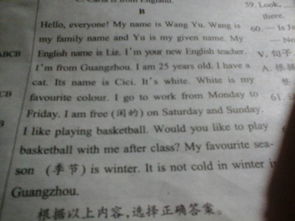先生的英文怎么说
How to Translate "先生" into English?
内容:
The term "先生" is a commonly used honorific in Chinese culture to address a man in a respectful and polite manner. When translating "先生" into English, there are a few options depending on the context and the relationship between the speaker and the addressed individual. Below are some possible translations:

1. Mr.
"Mr." is the most common and straightforward translation for "先生." It is used before a man's surname or full name to indicate respect. For example, if Mr. Wang is addressed as "王先生" in Chinese, the appropriate translation would be "Mr. Wang" in English.
2. Sir
In certain formal or polite contexts, "sir" can be used as a translation for "先生." It is a respectful way to address a man without using his name. For example, when speaking to a stranger or a customer, you can say "Excuse me, sir" instead of "Excuse me, Mr. Wang" if you don't know their name.
3. Gentleman
"Gentleman" is a more literary or oldfashioned translation for "先生." It can be used to address a man or refer to a group of men. This translation is often seen in formal writing or historical contexts. For example, "The gentlemen gathered for a meeting" or "May I help you, gentlemen?"
It's important to note that the choice of translation may vary depending on the cultural and social norms of the Englishspeaking country or region. For example, in some Englishspeaking countries, it is more common to use "Mr." in formal and informal situations, while in others, "sir" might be preferred. Therefore, it's always a good idea to consider the specific context before deciding on the most appropriate translation.
In conclusion, when translating "先生" into English, the most common options are "Mr.," "sir," or "gentleman." The choice of translation should be based on the context and the level of formality required.












评论